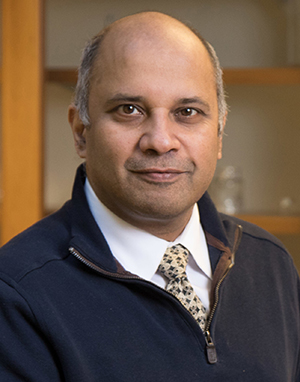Article
Press Release
Colon Microbes Provide Clues to Favorable Treatment Options in a Subset of Colon Cancer Patients
Author(s):
Investigators from Rutgers Cancer Institute of New Jersey, New Jersey’s only National Cancer Institute-Designated Comprehensive Cancer Center, led a collaborative study to examine the patterns of druggable oncogenic fusions in colon cancer specimens including microsatellite-stable and unstable tumors.
Shridar Ganesan, MD, PhD

Investigators from Rutgers Cancer Institute of New Jersey, New Jersey’s only National Cancer Institute-Designated Comprehensive Cancer Center, led a collaborative study to examine the patterns of druggable oncogenic fusions in colon cancer specimens including microsatellite-stable and unstable (MSI) tumors. Subhajyoti De, PhD, researcher at Rutgers Cancer Institute and Shridar Ganesan, MD, PhD, chief of molecular oncology, associate director for translational research, and Omar Boraie Chair in Genomic Science at Rutgers Cancer Institute, who are both faculty members at Rutgers Robert Wood Johnson Medical School, are senior authors of the work and share more about the findings published in the online version of JCO Precision Oncology (DOI: 10.1200/PO.21.00477).
Why is this topic important to explore?
A subset of colorectal carcinoma (CRC) arises in the setting of an underlying defect in mismatch repair leading to microsatellite instability (MSI), a phenotype defined by variation in the length of microsatellite repeats. MSI colon cancers are very responsive to immune checkpoint blockade, and advanced occurrences of this disease are now routinely treated with such agents approved in this indication. Unfortunately, only about half of MSI CRC patients benefit from these agents, creating an unmet need for other treatment approaches for these cancers. It is possible that combined therapy targeting oncogenic driver fusion genes and immune checkpoint blockade may lead to improved long-term outcome in kinase fusion positive MSI CRC.
Describe the work and tell us what the team discovered.
This collaborative project examined the patterns of druggable oncogenic fusions in 32,218 colon cancer specimens including microsatellite-stable and unstable (MSI) tumors. Dr. Russell Madison from Foundation Medicine, and Dr. Xiaoju Hu from Dr. De’s lab are joint first authors in this work. Their analysis indicated that MSI CRCs are enriched for specific gene fusions, specifically those involving NTRK1 and NTRK3, as well as RET, ALK, and BRAF. Interestingly, this enrichment of oncogenic fusions in MSI cancer seems to be limited to CRC, and not seen in MSI endometrial cancer or other MSI cancers generally, suggesting that the enrichment of specific gene fusions in MSI CRC may be both due to the MSI phenotype and a tissue of origin specific effect. Detailed analysis of breakpoints in MSI-associated kinase fusions support a model in which inefficient repair and/or processing of microbiome-induced clustered 8-oxo-G damage in MSI CRC contributes to the increased incidence of specific oncogenic fusions.
What are the implications of these findings?
This study provides clues why colon cancer harboring MSI is enriched for specific oncogenic kinase fusions, which are uncommon in other mismatch-repair deficient cancers. The team reports that repair of 8-oxo-G adducts, which arise in the intestine as a byproduct of microbial metabolism, is impaired in mismatch-repair defective tumors, promoting mutagenesis and DNA breaks, likely causing these oncogenic fusions. Thus the combination of the DNA repair defect present in these cancers and the presence of microbiome-induced DNA damage may lead to the increased incidence of gene-fusion in MSI colon cancers. These observations can help rationally prioritizing oncogenic driver fusion genes for combined therapy with immune checkpoint blockade, which may lead to better outcome in a subset of CRC patients. This data also suggests that the intestinal microbiome may contribute to the pathogenesis of a subset of MSI colon cancers.


















%20(2)%201-Recovered-Recovered-Recovered-Recovered-Recovered-Recovered-Recovered-Recovered-Recovered-Recovered-Recovered-Recovered-Recovered-Recovered-Recovered-Recovered-Recovered.jpg?fit=crop&auto=format)
%20(2)%201-Recovered-Recovered-Recovered-Recovered-Recovered-Recovered-Recovered-Recovered-Recovered-Recovered-Recovered-Recovered-Recovered-Recovered-Recovered-Recovered-Recovered.jpg?fit=crop&auto=format)
